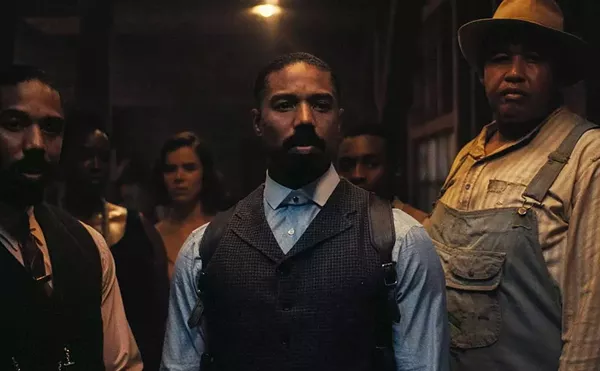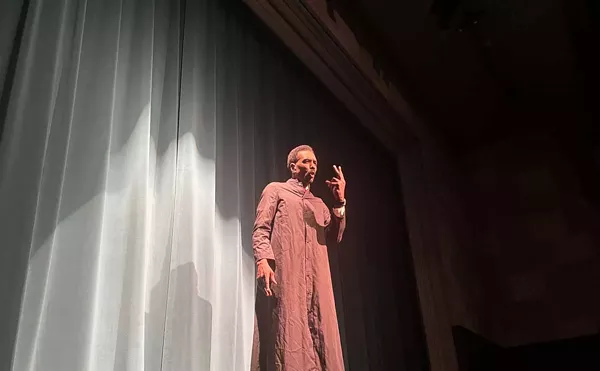
Audio By Carbonatix
[
{
"name": "GPT - Leaderboard - Inline - Content",
"component": "35519556",
"insertPoint": "5th",
"startingPoint": "3",
"requiredCountToDisplay": "3",
"maxInsertions": 100,
"adList": [
{
"adPreset": "LeaderboardInline"
}
]
}
]
The first three quarters of Neil Jordan’s Ondine are so refreshingly tender, so beautifully unpredictable, it’s tragic how banal his noirish final act is. For nearly 90 minutes, the Irish director (The Crying Game, Interview with a Vampire) blurs the line between fantasy and reality, constructing a bittersweet fairytale that understands that magic has nothing to do with comic book special effects and elaborate costumes, but rather how myth becomes metaphor, and people connect through their imagination. Mood, setting and characters have replaced high-priced pixels and the film’s low-key enchantment takes hold. Unfortunately, Jordan injects real-world violence into his finale and nearly unravels the spell he’s worked so hard to cast.
Colin Farrell is Syracuse, an Irish fisherman and recovering alcoholic divorced from his wife and struggling to remain connected to his precocious but sickly 10-year-old daughter, Annie (played by the terrific Alison Barry). One day, Syracuse discovers a gorgeous, barely conscious young woman (Alicja Bachleda) in his fishing net. Is she a selkie (half-seal, half-woman)? Or is she just a girl on the run? Naming herself Ondine, she shies away from other people, sings in a language Syracuse has never heard, and seems to bring him good luck. Inevitably, sparks fly between the two, and Syracuse doesn’t care who or what this bewitching young woman is. That is, until an outsider comes looking for Ondine and his daughter is threatened.
Updating fables is nothing new for Jordan. His second film (The Company of Wolves), was a wickedly clever horror that riffed on the Little Red Riding Hood legend. His recent films — The Brave One, The Good Thief — are more solidly rooted in the real world but still retain Jordan’s affections for mythological subtext. Ondine seems to represent an ambitious middle ground, where he can eat his cake and have it too. Jordan explores the transformative influences of storytelling, making it clear that fairytales, like religion, can become an act of faith. Annie and Syracuse begin to believe their "Once upon a time" because alcoholism, poverty and kidney failure give them little else to hold on to and Catholicism has mostly failed them. Yes, the world is a flawed and brutal place. Still, the sun shines. And we begin to wonder whether it is the beautiful Ondine that twists their fate or the age-old tales father and daughter tell each other. It’s to Jordan’s credit that, for most of the film, we wonder whether the magic is real.
Cinematographer Christopher Doyle’s lived-in, gray-washed visuals suggest that something unknown and fantastical lurks in the shadows and beneath the waves. Jordan punctuates that dark coastal atmosphere with edits that continually shift perspective, never letting us know from whose point of view we’re watching, Similarly effective, Farrell delivers one of the best performances of his career. Vulnerable but stoic, charming but matter-of-fact, you understand his bitterness, guilt, and weaknesses but always see the decency underneath.
As with most fairytales, chaos and violence threaten to dispel all that’s good, and it's here that Jordan stumbles. Ondine’s past comes calling and its blunt literalness undermines the film’s poetic spirit. Too much is explained and most of it’s predictable, forcing a conclusion that feels gracelessly contrived. Jordan might argue that this was his intent: to subvert belief in the mystical. But in the end it’s his fantasy that feels authentic and the real world that comes off as a load of blarney.
Jeff Meyers writes about film for Metro Times. Send comments to letters@metrotimes.com.





